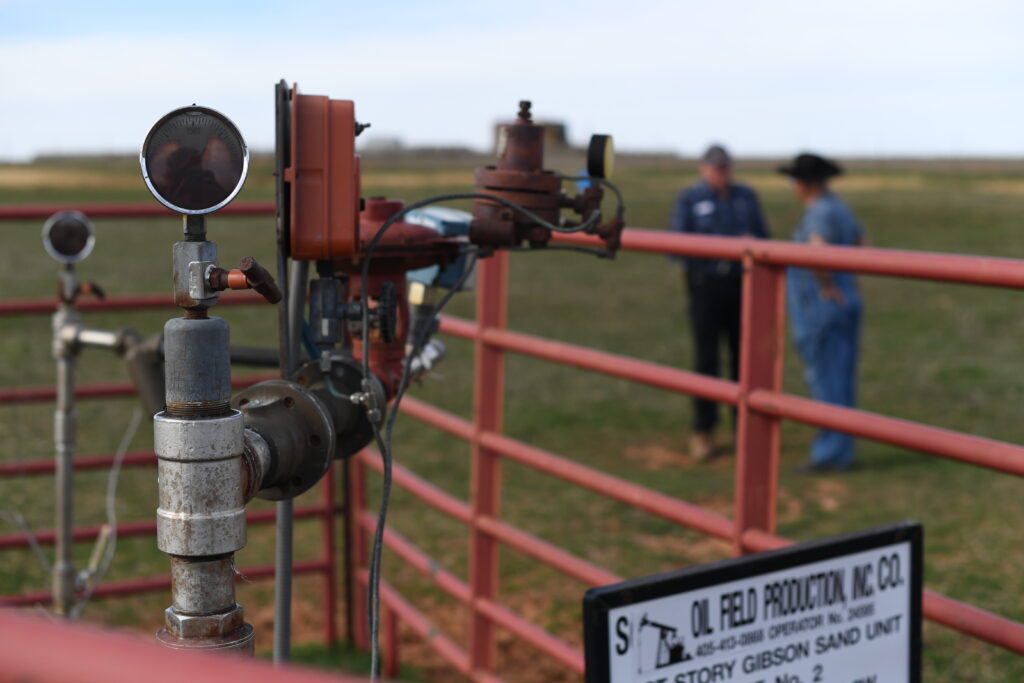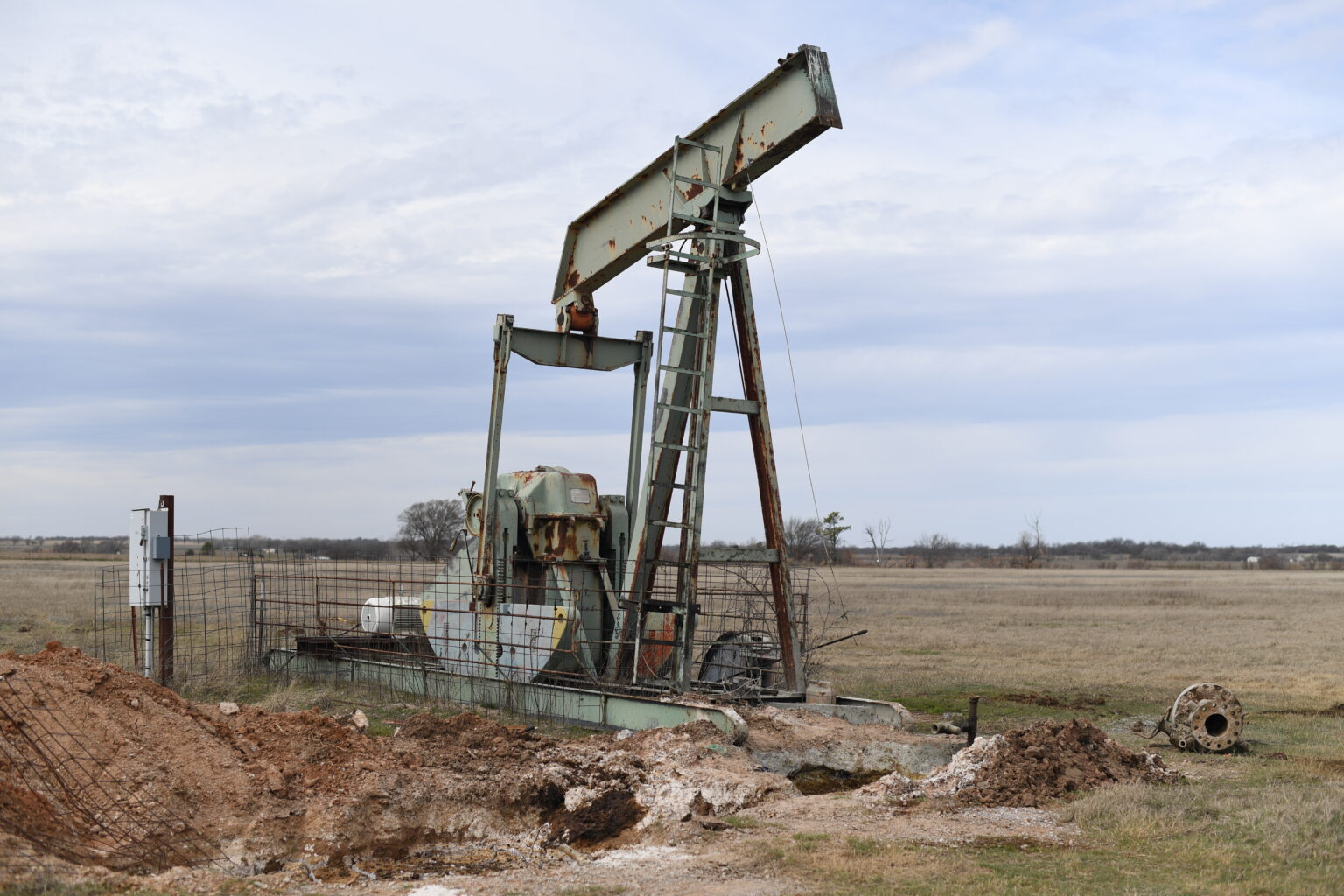Oklahoma’s oil and gas industry touts its altruism and environmental stewardship by pointing to a voluntary levy that companies pay on their production, which is then used to clean up orphan wells that have been left to the state.
But some of Oklahoma’s biggest oil companies have opted out of the fund, forcing the state to return millions of dollars that would have otherwise gone to restoring land scarred by discarded drilling infrastructure and contaminated by leaks and spills, according to a ProPublica and Capital & Main analysis.
Subscribe to our newsletter
Stay up to date with DeSmog news and alerts
The list of companies that received such refunds includes some of the Oklahoma oil industry’s household names, such as Ovintiv and Chesapeake Energy Corp. It also includes the two richest people in the state: Harold Hamm, a pioneer in fracking technology and the founder of the multibillion-dollar Continental Resources, and George Kaiser, whose success as head of his family’s oil company helped him buy the Bank of Oklahoma.
All told, dozens of oil companies received refunds worth about $11 million over the past seven years, ProPublica and Capital & Main found. Put another way, for every $100 the state brought in via this funding mechanism, it sent $8.58 back to oil companies.
The Oklahoma Energy Resources Board, created by the Legislature in 1993, collects a 0.1 percent assessment on oil and gas production that functions like a tax on the state’s largest industry. The roughly $163 million collected — after refunds — since the levy’s inception has funded the restoration of more than 20,000 sites.
If the board had not had to issue the millions of dollars in refunds, it could have restored an additional 1,500 orphan well sites, according to the board’s average cleanup bill. Until they are plugged, these wells can leak a litany of pollutants, from toxic gasses to salty wastewater, presenting an environmental crisis across Oklahoma.
ProPublica and Capital & Main reached out to all 76 companies that requested refunds in the past seven years as well as to the main in-state trade groups, the Oklahoma Energy Producers Alliance and the Petroleum Alliance of Oklahoma. The Petroleum Alliance of Oklahoma, Hamm’s Continental Resources, Kaiser’s Kaiser-Francis Oil Co., Chesapeake Energy and Ovintiv did not respond to requests for comment.
Only two oil producers answered questions: one said she requested refunds to cut down on contact with regulators, while the other dismissed concerns about the refunds, stating that “it’s not that much money.”
Zack Taylor, a spokesperson for the Oklahoma Energy Producers Alliance, wrote in an email that the board “has done very important work cleaning up abandoned well sites all over Oklahoma.” But, he added, “We believe it should be an opt in program so the smaller producers and royalty owners could agree up front whether or not to participate.”
In addition to paying for orphan well site cleanup, the Energy Resources Board’s levy funds pro-fossil fuel marketing campaigns that range from K-12 curricula promoting the industry in classrooms to programming with Mike Rowe, the reality television star known for the show “Dirty Jobs.”
Mindy Stitt, the Energy Resources Board’s executive director, said the state’s oil companies “exemplify what it means to be a good neighbor.”
“They contribute millions of dollars to our programs, even if they must request a refund some years, making significant impacts across our state,” she said.
Oklahoma’s Orphan Well Epidemic
Not everyone sees it that way.
Don Scott has worked his farm in south-central Oklahoma for years, harvesting hay while carefully avoiding an orphan well that scars one of his fields. The green pump jack stood inoperable on a recent visit to the farm, rust eating through the metal. Salt contamination had turned the soil an unnatural white, the dirt cracking at the base of the well.

The well occupies otherwise productive land and could leak more pollutants into the environment. “And that ain’t counting the aggravation of having to work around it,” said Scott, whose father and grandfather worked in the oil fields and who now laments the state’s orphan well epidemic.
More than 18,000 wells have already been labeled as orphans by the Oklahoma Corporation Commission, the state’s main oil regulatory body. That number is likely to swell, as the state has more than a quarter-million unplugged wells — some active, some already idle — according to data from energy software firm Enverus.
But the money available for cleanup pales in comparison to the task. The Oklahoma Corporation Commission collects its own tax, which has generated only a several-million-dollar orphan well fund. The state quickly exhausted federal money it received from the Infrastructure Investment and Jobs Act to plug wells. And drillers have set aside only 0.6 percent of the projected cleanup cost via financial instruments called bonds, according to a ProPublica and Capital & Main analysis of state data.
This leaves the Energy Resources Board and its voluntary cleanup fund as an important tool in Oklahoma’s struggle to address its unplugged wells.
If the Energy Resources Board fund continues to be voluntary in a state that’s already slow to impose regulations on its most lucrative industry, critics say, then companies should at least be required to set aside enough money to plug their own wells.
“Local industry also has a part to play in funding remediation,” said Kara Joy McKee, director of the Sierra Club’s Oklahoma chapter. “It should be a general obligation of the industry that has received so much wealth from the resources of this state.”
Big Oil, Big Refunds
Some of the state’s major oil producers top the list of companies that requested refunds.
Continental Resources received nearly $1.6 million in refunds over the seven years for which the Energy Resources Board maintains data, while Kaiser-Francis Oil took in about $490,000.
Ovintiv, an $11 billion oil company, was by far the largest recipient, as its subsidiaries and related entities got more than $3.8 million back.
Next on the list, a partnership between large driller Mach Resources and private equity firm Bayou City Energy Management received more than $2.1 million in refunds. Neither company responded to requests for comment.
The Oklahoma City-headquartered Chesapeake Energy, valued at $10 billion, also appeared on the list, getting a more than $400,000 refund.
And companies belonging to the McCasland family, longtime Oklahoma oil producers, filed dozens of requests totalling several hundred-thousand dollars in refunds. One of the family’s companies, Twin D Energy, repeatedly pursued the refund, even when it stood to only get back amounts as low as $2.57, $3.47 and $3.71 in a given year. Tom McCasland III, the president of the family’s companies, said they only request refunds for their own portion of oil production, not for other working interest owners.
‘It Ought to Be There Permanently’
Oklahoma has a sunset law that sets the date by which the state must dissolve or renew certain government agencies, and the Energy Resources Board is facing the chopping block. In 2023, its sunset date was pushed back to 2025 to give lawmakers time to decide what to do with the agency. But several bills proposed in this year’s and last year’s legislative session to extend or update the board’s mandate failed.
Instead, the state’s oil trade groups have entered negotiations to draft their own language destined for the Legislature. Some of their ideas threaten to further undermine funding for the board’s cleanup work.
On one hand, the trade groups are discussing provisions to allow the board to plug wells instead of only cleaning up surface contamination. But some oil companies are also aiming to make it easier to avoid paying the assessment that funds the board’s work, potentially only collecting money from drillers who opt in.
“There are people that don’t feel that it is really refundable,” said McCasland, who serves as the Oklahoma Energy Producers Alliance’s chairman in addition to his work with his family’s oil companies. As a result, the negotiations have included discussions about the ease of getting the money back.
Every dollar refunded is one less dollar spent cleaning up the industry’s orphan wells, so landowners like Scott, the farmer with an orphan well on his land, might have to continue waiting to see old, leaking infrastructure removed from their property.
The Energy Resources Board is a “good thing,” Scott said, and it has begun cleanup on his land. So he expressed frustration upon learning that oil companies regularly ask the board for refunds.
“Once it’s paid in,” he said, “it ought to be there permanently.”
Mark Olalde reported from ProPublica; Nick Bowlin from Capital & Main.
Subscribe to our newsletter
Stay up to date with DeSmog news and alerts







